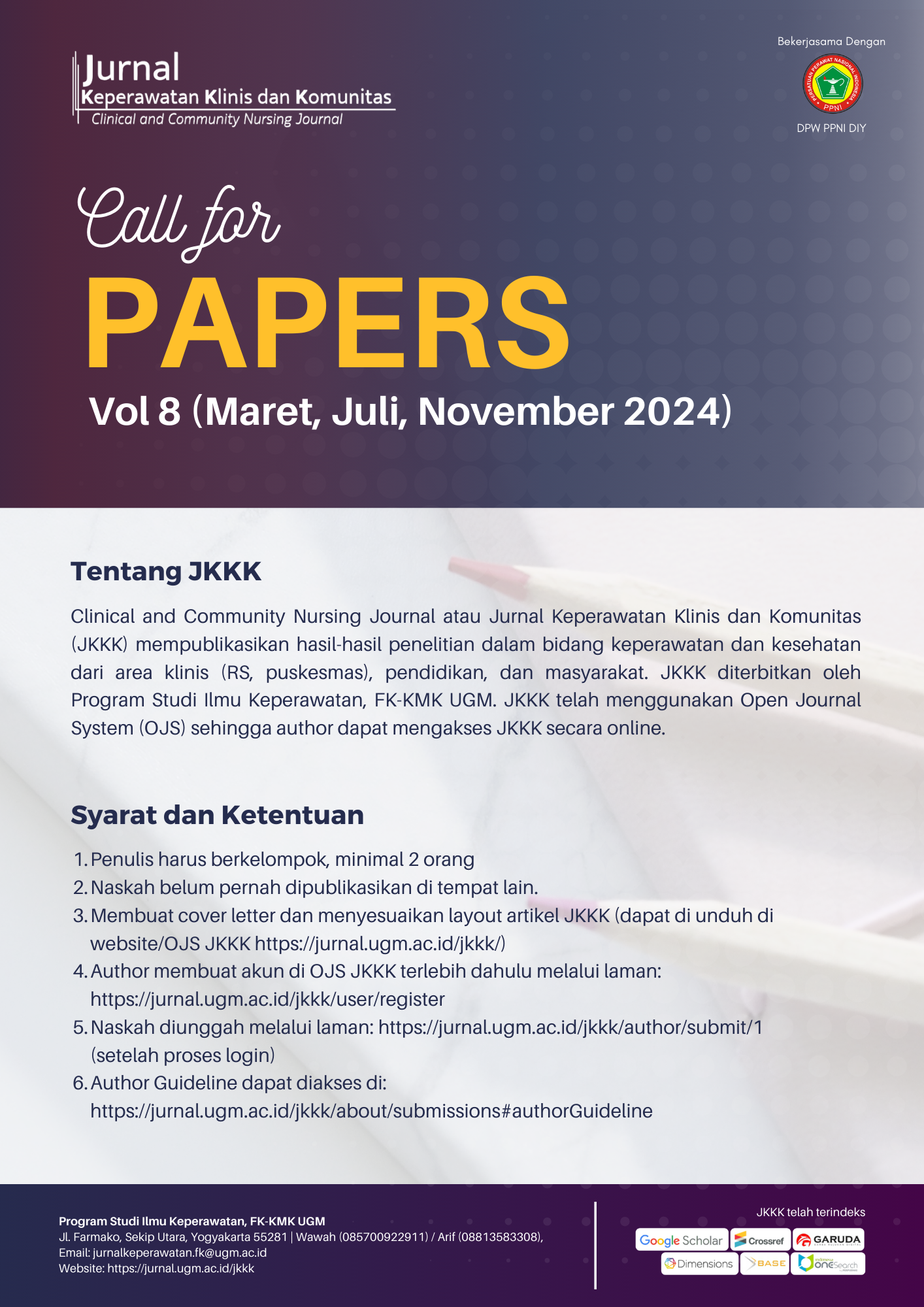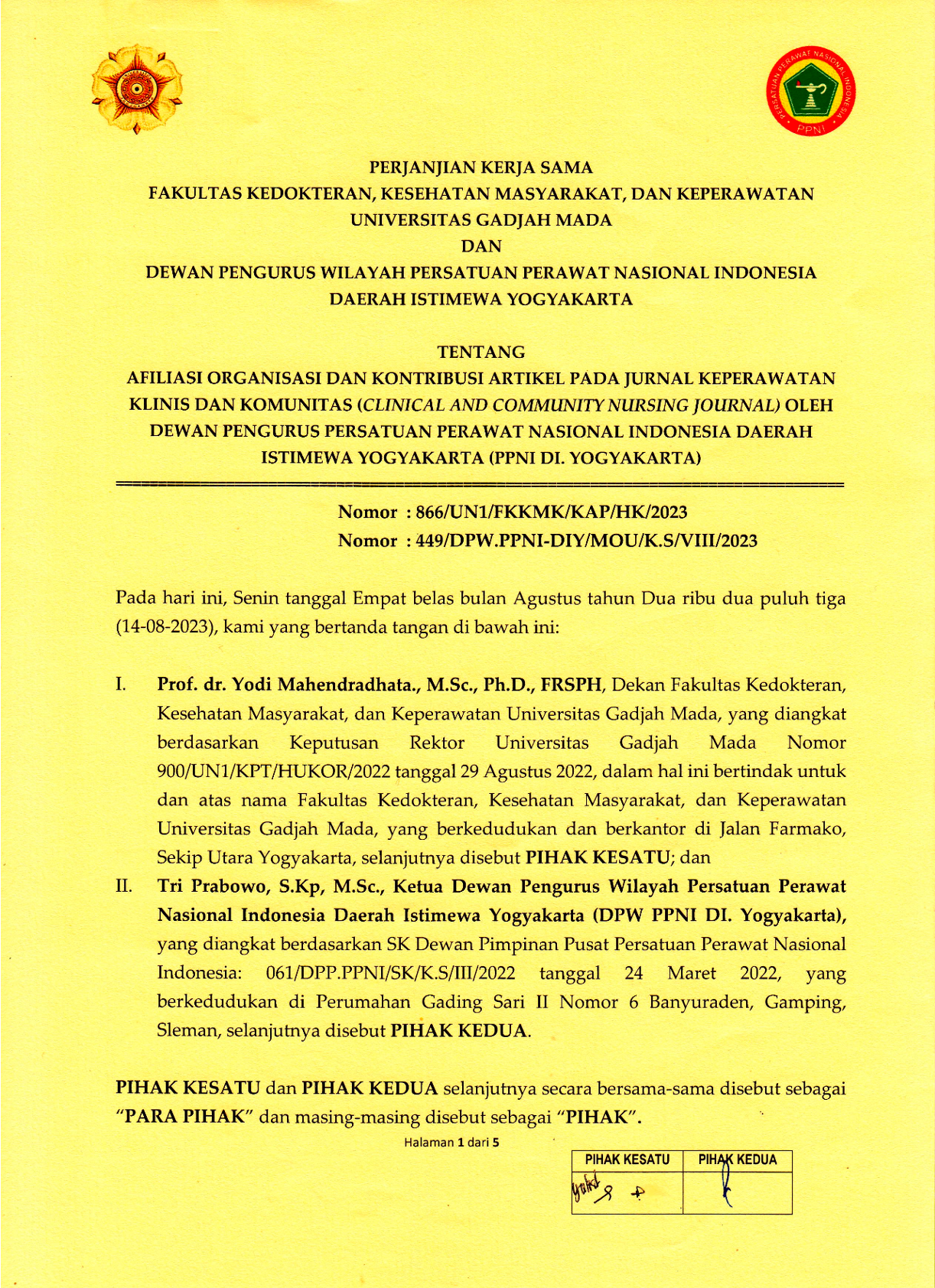Pengaruh Edukasi terhadap Pengetahuan dan Kepatuhan Obat pada Penderita TB di Karanganyar
Giovanni Iga Firmanda(1*), Wahyu Nur Pratiwi(2), Rita Dewi Sunarno(3), Aries Wahyuningsih(4)
(1) Prodi Keperawatan, Fakultas Kesehatan, Institut Ilmu Kesehatan Bhakti Wiyata Kediri
(2) Prodi Keperawatan, Fakultas Kesehatan, Institut Ilmu Kesehatan Bhakti Wiyata Kediri
(3) Prodi Keperawatan, Fakultas Kesehatan, Institut Ilmu Kesehatan Bhakti Wiyata Kediri
(4) Program Studi Administrasi Rumah Sakit, Sekolah Tinggi Ilmu Kesehatan Rumah Sakit Baptis Kediri
(*) Corresponding Author
Abstract
Introduction: Pulmonary Tuberculosis (TB) is one of infectious diseases which remains as significant health issue in communities. The increasing cases of TB are often caused by medication non-adherence.
Objective: To evaluate the effect of educational intervention toward medication knowledge and adherence among TB patients in Karanganyar.
Method: This study was pre-experimental research with a One Group Pretest-Posttest design involving 30 TB patients as respondents, which were selected using purposive sampling. The respondents were provided with education in the form of direct counseling on TB disease, the importance of medication adherence, and the consequences of non-adherence behavior. The education was conducted in one group session lasting 30-45 minutes, where all participants engaged together in the session. Data were collected through questionnaires measuring medication knowledge and adherence before and after the education. Statistical analysis was performed using a paired t-test to compare the knowledge and adherence scores before and after the intervention.
Results: The results showed a significant increase in the knowledge score and adherence of respondents’ treatment after education. The average knowledge score before education increased from 6,53 to 7,93 points. Likewise, the average adherence score before education increased from 8,97 to 17,27. The paired t-test obtained a p-value of 0,000 for both variables.
Conclusion: Direct health education significantly improves the knowledge and treatment adherence of TB patients.
Latar belakang: Penyakit menular menjadi masalah kesehatan yang signifikan di masyarakat dan Tuberkulosis Paru (TB) menjadi salah satu penyakit menular yang paling mengkhawatirkan. Peningkatan jumlah kasus TB sering kali disebabkan oleh ketidakpatuhan terhadap pengobatan.
Tujuan: Penelitian ini bertujuan untuk menganalisis pengaruh dampak edukasi terhadap pengetahuan dan kepatuhan pengobatan pada pasien TB di Karanganyar.
Metode: Penelitian ini merupakan penelitian pra-eksperimental dengan desain One Group Pretest-Posttest dan melibatkan 30 pasien TB yang dipilih menggunakan metode purposive sampling. Responden diberikan edukasi dalam bentuk penyuluhan langsung mengenai penyakit TB, pentingnya kepatuhan pengobatan, dan dampak ketidakpatuhan. Edukasi dilakukan dalam satu sesi kelompok dengan durasi 30-45 menit, semua responden berpartisipasi secara bersama-sama dalam sesi yang dilaksanakan di balai desa. Data dikumpulkan melalui kuesioner yang mengukur pengetahuan dan kepatuhan pengobatan pasien TB sebelum dan sesudah dilakukan edukasi. Analisis uji statistik menggunakan paired t-test untuk membandingkan skor pengetahuan dan kepatuhan sebelum dan sesudah intervensi.
Hasil: Hasil penelitian menunjukkan peningkatan yang signifikan pada skor pengetahuan dan kepatuhan pengobatan pasien TBC setelah pemberian edukasi. Rata-rata skor pengetahuan sebelum diberikan edukasi dari angka 6,53 meningkat menjadi 7,93. Demikian halnya dengan rata-rata skor kepatuhan sebelum diberikan edukasi adalah 8,97 meningkat menjadi 17,27 setelah diberikan edukasi. Hasil uji paired t test diperoleh nilai p = 0,000 untuk kedua variabel.
Simpulan: Edukasi yang diberikan dengan penyuluhan secara langsung terbukti dapat meningkatkan pengetahuan dan kepatuhan pengobatan pada pasien TB secara signifikan.
Keywords
Full Text:
PDFReferences
WHO. Global TB Report 2022 Factsheet. World Heal Organ. Published online 2022. https://www.who.int/teams/global-tuberculosis-programme/tb-reports/global-tuberculosis-report-2022.
WHO. Tuberculosis Country Profile 2021 Indonesia. World Heal Organ. 2021:2.
Datiko DG, Jerene D, Suarez P. Stigma matters in ending tuberculosis: Nationwide survey of stigma in Ethiopia. BMC Public Health. 2020;20(1):1-10. https://doi.org/10.1186/s12889-019-7915-6.
Hossain R, Islam S, Akter S, Anisuzzaman AHM, Al-Maruf A, Mohammed N. Impact of Education on Non-Compliance and MDR TB Risk: Specialized Hospital Study. J Med. 2023;8(12):659-663. https://doi.org/10.36348/sjm.2023.v08i12.007.
Dameria D, Hulu VT, Siregar SD, Manalu P, Samosir FJ, Rambe FUC, Hasibuan N. Improvement of Patients’ Knowledge, Attitude, and Practice on Tuberculosis Treatment Using Video and Leaflet. J Promosi Kesehat Indones. 2023;18(2):79-88. http://dx.doi.org/10.14710/jpki.18.2.79-88.
Pomalango ZB, Arsad SFM, Nur, Yusuf NAR, Antu MS. Relationship between Knowledge Level about Drug-Resistant TB (TB-RO) and Medication Compliance in Pulmonary TB Patients. Jambura Nurs J. Published online 2024. https://doi.org/10.37311/jnj.v6i1.23867.
Sudrajat A, Ramadhani AA, Suratun, Iriana P, Lusiani D, Wartonah, Manurung S, Sumbara. Correlation of Knowledge and Family Support with Treatment Compliance of Tuberculosis Sufferers. AACENDIKIA: Journal of Nursing. 2023;2(2):52-60. https://doi.org/10.59183/aacendikiajon.v2i2.25.
Sari EA, Kumala S, Rafika D. Relationship Between Knowledge Level and Compliance in Tuberculosis Patients. Indones J Pharm Educ. 2023;3(1):103-109. https://doi.org/10.37311/ijpe.v3i1.18774.
Putra IWGAE, Dewi NPEP, Probandari AN, Notobroto HB, Wahyuni C. The Implementation of Comprehensive Health Education to Improve Household Contacts’ Participation in Early Detection of Tuberculosis. Heal Educ Behav. 2023;50(1):136-143. https://doi.org/10.1177/10901981211001829.
Daftary A, Frick M, Venkatesan N, Pai M. Fighting TB stigma: We need to apply lessons learnt from HIV activism. BMJ Glob Heal. 2017;2(4):4-7. https://doi.org/10.1136/bmjgh-2017-000515.
Morisky D, Ang A, Krousel-Wood M, Ward HJ. Morisky Medication Adherence Scale-8 (MMAS-8) [Database record]. APA PsycTests. 2008. https://psycnet.apa.org/doi/10.1037/t58716-000.
Khamis KM, Kadir Shahar H, Abdul Manaf R, Hamdan HM. Effectiveness of education intervention of tuberculosis treatment adherence in Khartoum State: A study protocol for a randomized control trial. PLOS ONE. 2022;17(11):e0277888. https://doi.org/10.1371/journal.pone.0277888.
Susanto WHA, Wospakrik F, Mulyanti M, Rahmawati R. Pendidikan Kesehatan tentang Tuberkulosis terhadap Peningkatan Pengetahuan dan Sikap Penderita dalam Pencegahan Penularan Tuberkulosis. J Telenursing. 2023;5(2):3900-3907. http://dx.doi.org/10.31539/joting.v5i2.7681.
Sariem CN, Dapar MP, Lenka NM, Kolawole J, Aguiyi J. Applying Psychological and Educational Health Models to Determine the Effect of a Pharmacist-led Cognitive and Behavioral Intervention on Tuberculosis Treatment Outcomes in Plateau State, Nigeria. Inov Pharm. 2022;26;13(4):10.24926/iip.v13i4.5031. https://doi.org/10.24926/iip.v13i4.5031.
Abdolrahmi M, Ghiyasvandian S, Zakerimoghadam M. Therapeutic coomunication in nursing. Electron Physician. 2017;9(8):4968-4977. https://doi.org/10.19082/4968.
Zatihulwani EZ, Sari GM, Rustanti E, Putra KWR. Knowledge, family support, and compliance for pulmonary tuberculosis medication among tuberculosis patients in the working area of rembang public health center, pasuruan. Nurse Holist Care. 2023;3(1):26–38.. https://doi.org/10.33086/nhc.v3i1.4538.
Perwitasari DA, Setiawan D, Nguyen T, Pratiwi A, Fauziah LR, Saebrinah E, Safira T, Nurulita NA, Wiraagni IA. Investigating the Relationship between Knowledge and Hepatotoxic Effects with Medication Adherence of TB Patients in Banyumas Regency, Indonesia. International Journal of Clinical Practice. 2022;2022(1):1-6. https://doi.org/10.1155/2022/4044530.
Ardiansyah A, Rizanti AP, Azwar A. Intervensi Pemenuhan Kebutuhan Spiritual Pasien Di Rumah Sakit : Literatur Review. Jurnal Berita Ilmu Keperawatan. 2021:14(2):92-101. https://doi.org/10.23917/bik.v14i2.13550.
Widiharti W, Sari DJE. The Effect of Providing Health Education on Transmission Prevention Behavior and Treatment Compliance Among Tuberculosis Patients Using the Health Belief Model Approach. undamental and Management Nursing Journal. 2022;5(2):45–50. https://doi.org/10.20473/fmnj.v5i2.43446.
Cheristina C, Maryam S. Impact of health education on the compliance level of lung tuberculosis patients to prevent the transmission of mycobacteria tuberculosis. Jurnal of Islamic Nursing. 2022; 6(2):98-102. http://dx.doi.org/10.24252/join.v6i2.25117.
Yoo-Ri J, Mi-Aie L. A study of relationships among tuberculosis knowledge, family support, and medication adherence in tuberculosis patients. Journal of Korean Academic Society of Nursing Education. 2022;28(1):80-90. https://doi.org/10.5977/jkasne.2022.28.1.80.
Bresenham D, Kipp AM, Medina-Marino A. Quantification and correlates of tuberculosis stigma along the tuberculosis testing and treatment cascades in South Africa: a cross-sectional study. Infectious Diseases of Poverty. 2020;9(1):1-13. https://doi.org/10.1186/s40249-020-00762-8.
Li J, Chung PH, Leung CLK, Nishikiori N, Chan EYY, Yeoh EK. The strategic framework of tuberculosis control and prevention in the elderly: A scoping review towards End TB targets. Infectious Diseases of Poverty. 2017;6(1):1-12. https://doi.org/10.1186/s40249-017-0284-4.
Article Metrics
Refbacks
- There are currently no refbacks.
Copyright (c) 2025 Giovanni Iga Firmanda, Wahyu Nur Pratiwi, Rita Dewi Sunarno, Aries Wahyuningsih

Jurnal Keperawatan Klinis dan Komunitas (Clinical and Community Nursing Journal)
collaborates with DPW PPNI DIY
![]()
Jurnal Keperawatan Klinis dan Komunitas (Clinical and Community Nursing Journal) is licensed under a Creative Commons Attribution-ShareAlike 4.0 International License.





